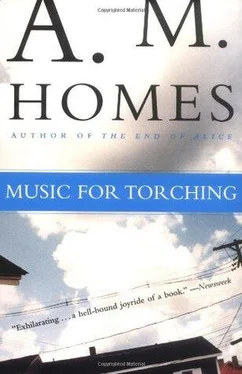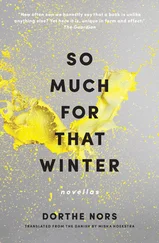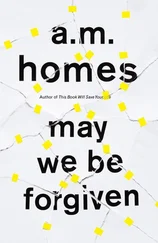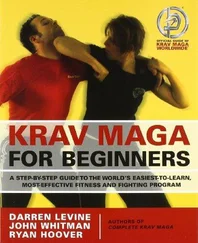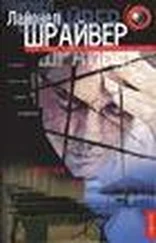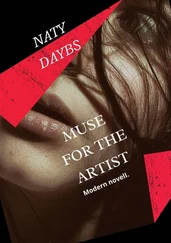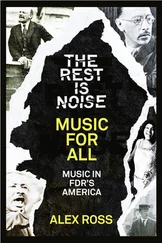"How was work?"
"I made watercolors all day," Paul says.
"Is that a good thing?" Elaine asks, thinking of the one on the fridge.
"Warburton thought so."
"Good," Elaine says.
"And you?"
"The architect, lunch with Liz, school play-Sammy was great."
"Sammy is great," Paul says.
The supermarket is deserted. It is frigid and bright. Paul squints. Elaine fumbles through her purse for her sunglasses. The long fluorescent tubes blast them with an unearthly white light. Elaine takes a cart, pushing it up and down the rows. The wheels rattle. Paul trails behind. Aisles and aisles, brand names, variations on a theme: Buy me, try me, new and improved, better color, texture, flavor.
Elaine has a long list; she's written down everything they need. Butter, sugar, milk, happiness, comfort, satisfaction.
Milk, OJ, coffee. There is a row for everything. On some aisles she shops well, planning ahead, buying the economy size in anticipation of desire, need to come. On others she takes nothing from the shelves; expiration dates make her anxious, the dairy case upsets her enormously-too much pressure.
She imagines not being married to Paul. Could they live without each other? Without the weight, the pull of one against the other? This is the fabric they are made of-they are a knit, like Siamese twins. What would ending it mean? She can't imagine it over. What is "over"?
"Do you even like me?" she asks Paul in the produce section.
"Oh, Elaine," he says.
"I thought so," she says. "Do you like fruit?" she asks.
He looks at her oddly-Mrs. Apple?
She flashes a few plums in a bag.
"Fine," he says.
The squeaky wheel. The wire basket. She throws things into the cart. What does she want? What does Sammy like? What does Daniel need? What does it take to keep them happy?
Cookies.
Paul goes for the sugar. In aisle 19, the cell phone rings. His pocket rattles like an alarm.
"You're ringing, sir," the stock boy says.
He ignores it.
It rings twice more.
"Ringing," the boy says again, loudly, as if Paul didn't hear him the first time.
Paul hands him the phone. "You answer it."
"Price Slasher, may I help you?" the boy says.
Pause.
"I'm in baked goods, near frozen foods."
Pause.
"No, ma'am, I've never had a Hungry Man Dinner."
Pause.
"Five-seven, blond hair, green eyes, zits. I get off at ten." He hands the phone back to Paul. "Cool, very cool," the kid says, and goes back to pricing angel food cakes.
"Don't mention it."
Elaine is on the other side of the store, searching for spray starch. Pat used it on everything; it kept the fabric stiff.
If the marriage is falling apart, is there anything they can do to stop it? Or should they just let it go, let it completely unravel? Elaine wonders. She wheels past a display of Jell-O letters laid out on Styrofoam boards like chicken parts. An edible alphabet in orange, red, or green. Elaine imagines writing a Jell-O note: Welcome Home. Back at four. Help me. She imagines writing something in Jell-O and wonders how many packs it would take to say something substantial. She throws four into the cart.
"What do you want for dinner?" Elaine asks Paul when he comes back, a pound of sugar in hand.
"Why don't we each have whatever we want, a free-for-all?"
"I'm sick of whole meals," Elaine says. "Let's just have appetizers, all appetizers-gherkins, Stilton, smoked salmon."
"Kippers and cream," Paul says. "A big antipasto. Artichoke hearts. Miniature egg rolls, cheese puffs, pigs in blankets."
"Whatever you want."
"I'm thinking martinis," Paul says.
Elaine puts a jar of jumbo olives into the cart.
"Do we have gin?"
"I hope so," Elaine says.
"I hope Mrs. Hansen didn't drink it all."
"Do you want to run to the liquor store?"
"Maybe." He goes off.
If Elaine and Paul divorce, how will they pay for things? They will be two poor households instead of one. Elaine will have to work-who will hire her? Will she be a saleslady with swollen ankles, folding clothes at Bloomingdale's, or will she become a travel agent and plan other people's exotic adventures, or sell Avon products door-to-door? The career counselor said nothing about working in retail.
She wanders through the bakery department. There are half cakes for sale. There's something depressing about half a cake, the cut frosted over as though no one would notice. A cake isn't something that's supposed to be split; it can be bigger or smaller, but not cut in half.
Paul has her paged. "Elaine. Elaine. Please meet your party at the Customer Courtesy Counter."
She pushes her cart to the front of the store.
"May I help you?" the courtesy lady asks, leaning over the counter as Elaine approaches. "Have you reached your party?"
Paul is there in his raincoat. He has dashed to the liquor store and is holding a paper bag, a bottle of gin and some horrible blue carnations wrapped in cellophane.
"Where were you?" he says. "I went up and down the aisles, I looked for you everywhere. I thought you'd evaporated."
"I'm stuck," Elaine blurts. Neither the courtesy lady nor Paul has any idea what she is saying-is it about the cart, the wheels? "If I don't do something soon, something horrible is going to happen to me." She had no intention of saying any of this here, now, but there it is.
The courtesy lady has politely turned away.
"Me, too," Paul says. "I think that's why I got the tattoo. I thought it would wake me up-like electroshock."
"We're all we have, and we're not enough," she says.
"It's good we noticed," Paul says. "We can go on from here."
"Do something," she blurts.
"What?"
"I don't know."
"Home," Paul says. "It's time to go home."
"You got gin?"
He nods.
It is almost ten o'clock. They still haven't eaten. His stomach is growling. They check out.
In the car on the way home, Elaine thinks of Paul, Paul when he was young, when he had hair and enthusiasm and energy, Paul when they first were together, when they talked about the future, when the boys were born, when they moved into the house-ascending. She thinks of Paul-there was supposed to be more, and now there is less.
Home.
"Doesn't look so bad, does it?" Paul says, pulling into the driveway. The house is dark. They sit in the car for a few minutes. Elaine doesn't want to go in; she doesn't want the house, she hates the house.
She remembers the last time she was happy with the house-it was the day before they moved in, the house was big and empty, and they hadn't started to pay for it yet.
Paul opens the door and unloads.
"It is a bottomless pit," Elaine says, getting out.
She turns on every light. She turns on the radio in the kitchen; they usually only use it on stormy mornings to listen for school closings.
Paul unpacks. Elaine goes upstairs to put toilet paper in the bathrooms.
There is a padlock on Daniel's door.
"Paul," she calls, her voice quizzical, curious.
A hasp and staple have been fixed to the wall. A metal loop and bracket, shiny, galvanized, bound by a thick padlock.
"Paul," she calls again.
"When did it happen?" he asks when she shows him the door.
"Can't tell."
"Do you think he did it, or was it the workmen?"
"Why would the workmen do it?"
"Well, he can't put a lock on the door. What has he got to lock up? What's he hiding?"
"Maybe it's just normal adolescent behavior."
"I'll take care of it," Paul says. "Do you have a hairpin?"
She gets him one and stands watching while he picks at the lock. He wiggles and jiggles, trying to get the innards to drop, to let go. It gets him into a frenzy. "I told you he was up to something." He slams his shoulder against the door. He kicks it hard. The door strains against the frame.
Читать дальше
